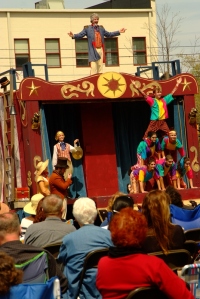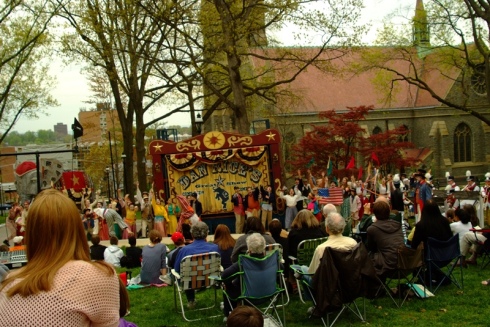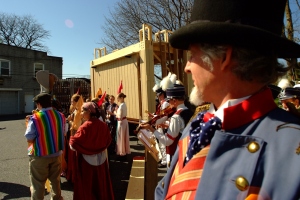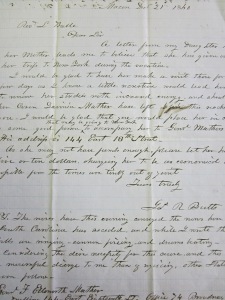This is the final batch of quote from the Moravian Newspaper from the years 1864 and 1865. As the war wound down there were less accounts in the newspaper of battles and men writing home, but everyone once and a while there was still news from the battlefield. I personally wonder why there were so few accounts during this time, I can only guess that the news was too difficult to read, and everyone was reaching the end of what they could take.
That being said, some of the most interesting documents I found were during these last years. The first letter quoted in this series is a great example of that.
1864 and 1865 – Letters
3/10/1864——This is a story of the Virginia 54th taking pity on the Ohio 3rd, and how for one night two sides of the war came together to eat and embrace their humanity. It’s my favorite letter from my research.
“Worn down, famished hearts heavy and haversacks light, they were herded like dumb, driven cattle, to wear out the night. A Rebel regiment, the 54th Virginia, being encamped nearby, many of its men came strolling about to see the sorry show of poor supperless Yankees…. And came streaming back with coffee kettles, corn bread, and bacon.”
“Loyal guests and rebel hosts were mingled; our hungry boys ate and were satisfied; and for that one night our common humanity stood acquitted of the heavy charge of total depravity with which it had been blackened.”
“And there is was that horrid war smiled a human smile, and a grateful, gentle light flickered for a moment on the point of the bayonet. And yet, should the 54th Virginia return tomorrow with arms in their hands to the Tennessee, the 3rd Ohio would meet them on the bank, fight them foot to foot, and beat them back with rain so pitiless the river would run red.”
11/17/1864——-The only letter I have found referencing Native Americans. It is an account of the son of a chief being held prisoner for 17 months, and then died only a month after he was released. The quote below is the entire write up of the account.
“Sir: The Hon. John Ross, Chief of the loyal Cherokees, who is a refugee from his country, residing in this city, has received by telegraph the painful intelligence of the death of his eldest son, James, who has been seventeen months confined in a rebel prison in Texas, enduring all the hardships and trials which their hatred to his father prompted them to inflict. He was only released a short time since, at the mouth of the Red River, in time to die, on the 9th inst., at Barnum’s Hotel, St. Louis, on his was to see his venerable father and two young motherless children, who, with their aunt and several parts of the Cherokee families, composed of women and children, have sought in the distracted state of their country an asylum in Bethlehem, PA. The Chief, deeply afflicted by the death, seemed to derive some consolation from the fact, as he expressed it, “that his son permitted by Divine Providence to die under the stars and stripes, and not in rebel hands.” As the Cherokee country is thoroughly infested with Genreal Prince’s rebel forces, he has ordered his remains to be brought, by Adams’ Express, to Bethlehem, Pa., where they will be interred in the Moravian burying ground, under which sod a number of his race sleep. The Moravians were the first missionaries among the Cherokees, before they were expelled from Georgia in 1835. I am, sir, yours truly, W.”
8/4/1864—— This letter gives accounts of the 46th latest battle including most recent casualties.
“The skirmishes were briskly engaged all the day long, and at half past three o’clock ours were driven in pell mell, and before we were in a position to receive an attack they were upon us.”
“Our gallant little General was ever where the fight was fiercest, giving every point his attention with a word of encouragement to everyone. The Colonel, (Selfridge) “old iron clad,” as he is now called, was fortunate as ever and is untouched. Major Griffith is all right. Capt. Stolzenbach, one of the bravest of the brave, who has never missed a battle, was struck in the sword hand whilst dressing his line and cheering his men. His hand was amputated—he is doing well, and will soon be home.”
“The regiment suffered severely. Killed 22; wounded 83; missing 9; total 114.”
2/16/1865——The following quotes come from extracts of McCarty’s letter describing the 500 mile and fifty day march from Atlanta to Savannah known as Sherman’s March to the Sea.
“Colonel Selfridge and his Adjutant came up and told us to move as close to them as possible without exposing ourselves. I got on a log to take a view of the rebels, when they suddenly opened with grapeshot, but as our men were lying down we escaped without injury.”
“Night having overtaken us we went into camp, and very glad we were, for we were very tired. Our loss was three men wounded. 10th (?), came upon the enemy’s camp, four miles from Savannah. Slight skirmishes until dark.”
“One man very near me was wounded whilst asleep, by a fragment of a shell. I heard him groan and at once got up, lit a candle, and found on lifting up his blanket, that the shell had taken off his left arm, and lodged in his side near the heart, and tearing away part of his lung. He said he must die, but he was willing, for he was a good man.”
“After we were all in line, the news came that the rebels had evacuated, leaving over 300 pieces of artillery in their fortifications. In our front they left two 60-pounders and one 20-pounder; on our left eight 32-pounders and four 12-pounders besides a quantity of ammunition.”
“On Christmas Day (Sunday) I went to Church, and heard an excellent sermon. The church was crowded with ladies, children, gentlemen and soldiers, and was beautifully decorated. My Christmas dinner I enjoyed at Captain Selfridge’s table. He is on detached service, and has his quarters in the city. We are again ordered to prepare for an active campaign.”
1864 – Cultural References
1/28/1864——-Lecture by Miss Debois, born a slave, but now free, delivered a speech about her life to a captive audience at Citizens Hall.
“A novel and instructive entertainment was given to a large and very respectful audience on the last Monday evening in Citizens’ Hall, where a colored lady, Miss Oneda Debois, born a slave in Alabama, delivered an admirable lecture, mainly devoted to her early experiences in the house of bondage, and the manners and customs of her adopted country.”
“Certainly her own lady-like demeanor, and the proofs of high mental culture afforded by her lecture are the very best, and indeed to every candid mind an almost irresistible evidence that the poor, despised and down-trodden people to whom she belongs are susceptible of great elevation. Her able vindication of this people, her proud disdain of the contumely so heaped upon them, her defense of their soldierly qualities, and a well-deserved panegyric pronounced by her upon the famous Haytien revolution, were exceedingly touching and even eloquent.”
“Her lectures, judging from what we have heard, can only subserve the cause of truth, justice, and genuine progress.”
2/18/1864——–The reception of the 46th Regiment home for a 30 day furlough.
“After having their ranks greatly thinned by sickness and casualties of many a hard fought battle field, have almost unanimously re-enlisted, and thus put the crowning touch upon their glorious achievements.”
“Such conduct merits the highest applause, and we are accordingly glad to record that our citizens, without distinction of party, did themselves honor by according to them a most cordial and enthusiastic reception. The boys of the 46th were met at the Depot by a large crowd, not withstanding the lateness of the hour of their arrival – which was after six o’clock in the evening – and escorted them into town in due style, by a procession led off by Marshal C. A. Luckenbach, Esq., and accompanied by a band of martial music.”
“The procession rested in front on Mr. Orville Grinder’s house in Main Street, where Colonel W. E. Doster, late of the 4th Pennsylvania Calvary addressed the soldiers in behalf of the community, saluting them in eloquent language, expressing the sincere admiration that is felt towards his devoted band, and paying a just tribute of respect to the heroes who have fallen.”












